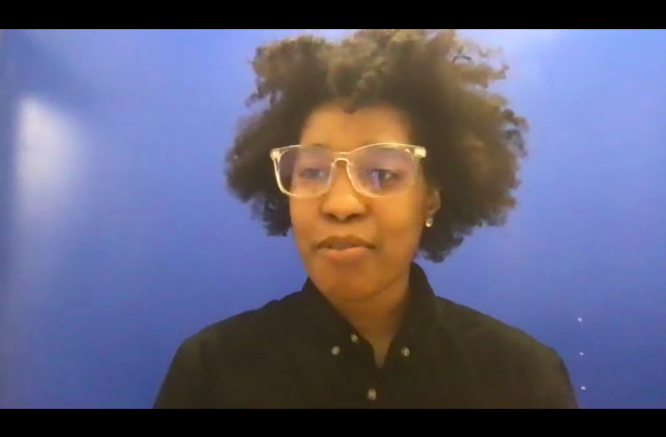Recounting her unconventional path to journalism, John S. Knight community impact fellow and WBGO North Public Radio community engagement reporter Brit Harley said her lifelong engagement with the Newark community led her “from the block to the newsroom.”
Harley said her experiences have led her to create three guiding principles to determine her future path — her core values, service and connections with her community. In whatever she does, Harley strives to ensure that she immerses herself within her community so as to most fully and ably serve it. And above all, Harley focuses on making information accessible for all: “Accurate information is a right, not a privilege.”
She felt she could only describe her present by starting with her past at the Thursday event, to explain “what even brought me to the newsroom in the first place.” As a child, she participated in church outreach programs such as soup kitchens and block parties. During her preteen and teenage years, Harley was a part of Newark’s Youth One Stop program, which centers on helping inner-city youth complete high school, build a resume and gain employment.
Harley found mentors through the program who taught her how to effectively engage with others, even at the most basic levels such as how to greet people as they walked through the door.
“It was in this program that I began to understand what it meant to be a Black kid in America,” she said. “I began to understand a lot of the inequities that we experienced in my communities.”
Harley decided at a young age that she would become a mentor for Youth One Stop when she got older. But, when she achieved this goal in late 2013, she felt somewhat unfulfilled. Harley came to realize that she “likes to think outside of the box.” Instead of following the “blueprint of society,” she concluded she would be most satisfied by creating her own path.
Harley’s path started to become clearer when she volunteered at Malcolm X Shabazz High School. She quickly found out that students at the school were not allowed to bring food or liquids to school for lunch or snacks because of security concerns. Stirred by both the situation and the students’ outrage at the inequity, Harley led a campaign advocating for change. She acknowledged the school’s concern for safety, but she stressed “what ways can we still honor young people’s humanity?” Harley managed to not only overturn the policy, but she also improved the cafeteria by establishing that it would provide water for each student.
In the spring of 2019, WBGO North Public Radio sought out a “New Voices Fellow” to add to their team. As Harley put it, WBGO wanted “someone who had community contacts, had an understanding of the community and really didn’t have a problem going to meet people where they were or to create or cultivate new relationships.” An application and a couple interviews later, Harley had the job.
By speaking with community elders, Harley discovered “how much the station really meant to them and how it served as a hub for people who needed information to come to.” During the pandemic, Harley and her colleagues at WBGO had to “reimagine and redefine” community collaboration. The group has created a story lab to analyze gaps in reporting and leveraged SMS texts to reach out to the community.
In a final note about journalism, Harley expressed her wish that reporters would focus more on communities rather than pure event coverage. She explained, “I think that it is super important to just show up places and not necessarily have a notepad or be like, ‘Well, there’s this event happening and let me just go cover that.’ That’s not really creating community or even trust.”
Harley said there should be symbiosis between the reporter and the community, and she added that in order for the information to be accurate and the audience engaged, the reporter and the community must have a bond.
